More than eight months after the resignation of CPN (UML) leader Madhav Kumar Nepal as Prime Minister of the country and after 16 failed attempts finally, on February 3, 2011, UML Chairman Jhalnath Khanal was elected the new Prime Minister, defeating NC and Madhesi candidates by huge margins of 368-120-67 votes respectively. This was facilitated by the ‘last minute sacrifice’ by the Maoist chief Prachanda, who decided to withdraw from the race and support Khanal instead. While withdrawing from the race, Prachanda said that he was doing so in an act of defiance against ‘Indian interference’.
This sudden and surprise development brings to an end, at least for the time being, months of political uncertainty and stalemate with the traditional democratic forces refusing to team up with the Maoists to form a coalition government till certain basic conditions were fulfilled. Given the fractured mandate in the Constituent Assembly (CA) with no party commanding absolute majority on its own, government formation was stalled since the Maoist, as the single largest party, claimed leadership position while the other parties insisted on disbanding of the PLA combatants and an unequivocal renunciation of violence as an option, before entering in to any deal with them on government formation. Despite repeated efforts to woo the smaller parties, including alleged attempts of financial inducement to certain parties, the NC, UML and the Madheshi parties had maintained unity and frustrated the Maoists in their design of capturing political power while still retaining their armed cadres. In other words, the democratic parties wanted the successful conclusion of the peace process, implementation of the CPA and other agreements before formation of a consensus government.
In this background, it is unlikely that Prachanda withdrew from the race only to block alleged ‘Indian interference’ in Nepal’s politics since the Maoists have a huge stake in the formation of the government at this defining moment to fulfill their ultimate objective of establishment of ‘people’s democracy’ in the country. For them the revolution is only mid-way through and a great deal still remains to be done. How it all happened so suddenly and dramatically amidst strong dissent within his party coming from the Bhattarai faction which wanted the Maoists to lead the government. The questions that were raised immediately were:-
- Was there a secret ‘deal’ between Prachanda and Khanal that led to the former withdrawing from the race in favour of the latter in round one itself?
- Does the ‘deal’ involve ‘compromises’ on the core issue of rehabilitation and integration of the PLA combatants?
- Will the UML compromise on the basic character of the constitution including dilution in the concepts of federalism, inclusiveness and the structure of State / governance?
- Will the Maoists seek to control the key ministries of Home, Foreign Affairs etc. to ensure smooth march in consolidating and strengthening the ‘gains of the revolution’?
These questions arose not only on account of the manner in which Khanal’s candidature was endorsed by Prachanda and the known ‘close and warm relations’ between the two for many years but also in the context of Prachanda’s recent (Kathamandu, Jan.17) pronouncement at a rally of junior party cadres where he stressed the party’s immediate goal to capture state power through ‘people’s revolt’, suggesting four types of preparation involving ideological issues, political strategy, organizational preparations and ultimately confrontation with the forces opposing the revolution. He had also clarified that the party will have to work to build favourable international environ; split the bureaucracy, army and the police; make appropriate physical conditions and finally mobilize the masses. Obviously within such a short time of three weeks his views would not have undergone a dramatic turn around!
The suspicion of a ‘deal’ between the two soon came into public domain with the media reporting a 7-point agreement between the senior representatives of the two parties under which, indeed, the Maoist had extracted assurances from Khanal on all these issues. The deal also included the concept of ‘rotational PM’ with Maoists taking over from Khanal within the next few months. It also transpired that people close to Prachanda and Khanal were already negotiating the deal for some time and it was not a sudden and impulsive act on the part of the Maoist supremo.
Not surprisingly, the ‘moderate’ elements in both the parties raised objections to the ‘deal’. More than 50 Maoist leaders loyal to Bhattarai openly challenged the move on the grounds that it was not approved by the party and that the cause of the ‘revolution’ would suffer if the Maoists did not lead the government at this critical time.
The CPN (UML) leaders also opposed the deal both in form and substance. Till recently the UML had maintained strong reservations against continuation of ‘parallel army’ by the Maoists. Their firm view was that governance and promulgation of constitution cannot happen ‘under the shadow of the barrel’. No doubt the PLA combatants were placed under the control of the Special Committee for Supervision, Integration and Rehabilitation headed by the Prime Minister, yet their insistence on keeping the Home Ministry under their charge and creating a separate force for the combatants gave their game away. Obviously, the new Home and Defence Ministers and the Army Chief would have very significant contributions to make in the decision making process on this issue.
The Nepal Army (NA) and virtually all political parities including UML are opposed to the concept of large scale induction of the former combatants into the NA and other security forces, for obvious reasons. The Maoist formula of 1 +1 +1 (parity between Nepalese Army, Security forces and the Combatants) across the board, is not acceptable. Also, the Maoist demand for ‘democratization’ of the NA is rejected by these stakeholders. Their argument is that the NA has already been democratized under the new Army Act, placing it completely under civilian control. The Maoist concept of ‘democratization’ goes well beyond this, since they perceive the role of the NA as critical to attainment of their ultimate objective of establishment of a monolithic state through revolution. Obviously Khanal has compromised on this issue?
On the other core issues enumerated above, the UML has consistently demanded a forward looking, inclusive and sustainable constitution based on the basic principles of justice, equality, rights of the people, independence of judiciary, human rights, state structure etc. that are essential components of parliamentary democracy. Maoists, while agreeing to these, insist on inclusion of ideological concepts too into the constitution to institutionalize the ‘peoples’ democracy. This has not found many takers amongst the democratic parties, the ethnic groups and even renowned constitutional experts who maintain that the constitution should not become the ‘political manifesto’ of any party. Apparently, Khanal has compromised on this issue as well.
The UML leadership under Madhav Nepal and K P Sharma Oli has accordingly blocked the implementation of the deal by not agreeing to hand over the Home portfolio to the Maoists. They want the security related ministries to remain under the charge of the Prime Minister. Khanal has not been able to move forward and even cabinet formation is on hold for the last 17 days and is unlikely to happen soon, unless the Khanal group manages to have his way at the meeting of the Central Committee of the party scheduled for February, 22. Meanwhile, the Maoists are furious at these developments and have threatened to stay out of the government while continuing to extend out side support to it.
Amidst these conflicts arising out of deep ideological divides, mutual suspicion and differences in core values and political philosophies, instability continue as before or perhaps at a more intense level. Conclusion of the peace process and constitution drafting exercise are unlikely to be accomplished before May 28, 2011 when the extended mandate of the CA will end. Will it be extended again? In the context of the recent developments, would the democratic and Madheshi parties endorse such a move? And worse still, if chaos returns, would the Maoists revert to violent movement leading to an open confrontation with the NA; a frightening scenario indeed.
The Maoist will have to make that strategic decision now as to where they want to take Nepal. Do they want to continue with their narrow, sectoral agenda of ‘institutionalising the gains of the revolution with the establishment of so called ‘people’s democracy’ or to work in the larger interest of the people of Nepal to usher in an era of peace, stability and democracy? Having emerged as the single largest parry in the CA, this choice rests primarily with them. They should not continue to interpret the results of the CA elections as an overwhelming popular endorsement of their political philosophy. After all, they must realize that the people of Nepal did not give them even a simple majority, thereby expect them to work with the other parties in the spirit of cooperation and not adopt a confrontationist approach.
The democratic parties, on the other hand, are also expected by the people to play their role in ensuring the fulfillment of their aspirations, not through ‘secret deals’ but in the true democratic tradition of public debate and public endorsement. It would be important for them to maintain unity of purpose which alone will help them address the serious issues confronting the nation and to arrive at a lasting solution of peace and inclusive democratic system in the country.
Author is former Chief of RAW
-----------------------------------------
Published date : 20 February, 2011

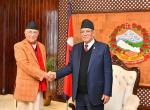
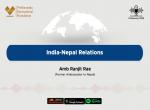
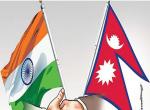
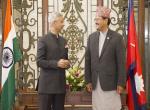

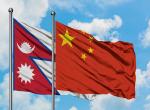


Post new comment